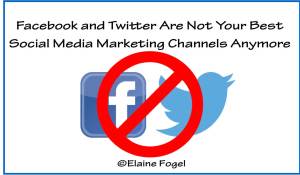Contests
I’ll  bet your small business or nonprofit organization spends considerable time on its Facebook page and Twitter account trying to engage new people. After all, aren’t these two social media sites the most effective in reaching prospects, customers, and donors?
bet your small business or nonprofit organization spends considerable time on its Facebook page and Twitter account trying to engage new people. After all, aren’t these two social media sites the most effective in reaching prospects, customers, and donors?
Not anymore says a recent Forrester study. “It’s clear that Facebook and Twitter don’t offer the relationships that marketing leaders crave. Yet most brands still use these sites as the centerpiece of their social efforts — thereby wasting significant financial, technological, and human resources on social networks that don’t deliver value,” says Nate Elliott of Forrester.
Now get this… “In the next 18 months… Facebook will become nothing but a repository for display ads,” Elliott predicts. Holy!!
So now what? Continue reading
Here’s a thought. What if nonprofits used consumer tactics like couponing, discounts, and contests to drive support? Sure, it’s a bit unusual, but not unprecedented.
The Princess Margaret Cancer Foundation in Toronto, Canada (my old home town) started the first fundraising lottery and many others throughout North America followed suit. Not only are the prizes amazing, they raise a ton of money.
But, what about smaller nonprofits? They can certainly do things on a smaller scale.
Check out the inspiration for this post - this new survey by Ipsos Open Thinking Exchange. When asked what the brands they follow on social media do to make them want to stay connected to them, 70% of US respondents indicated that the brands send them coupons for product discounts or free products. Next reason: Brands having contests or requests for suggestions regarding their current or new products (52%).
Even though nonprofits have used auctions (both silent and live), as well as raffles for years, there may be some new consumer-style concepts they can explore.
Ideas?
- Have discounts and “sales” on the nonprofit’s branded merchandise (promotional products). The more logo products there are in public, the more visibility for the mission.
- Time limited sales on bigger-ticket fundraising events (golf tournaments, dinners, balls, etc.). Sounds counter-productive? Test it. Post on social media that for the next 10 minutes anyone who signs up for the event gets $XX dollars off. See what happens. Then try it again.
- Get a sponsor to offer a free or deeply discounted product or service to anyone who makes a donation or registers for an event within a specific time period. Alternatives: over a certain dollar amount, OR… you create the rule.
Make things fun! A third of respondents (34%) also said that fun and interesting posts on social networking pages motivates them to stay connected.
Got any more ideas?

 Chances are your business or nonprofit organization is spending a lot of time nurturing social media relationships on Facebook and other networking sites. Are you gaining brand loyalty from these contacts?
Chances are your business or nonprofit organization is spending a lot of time nurturing social media relationships on Facebook and other networking sites. Are you gaining brand loyalty from these contacts?
Here’s the good news based on a new study by Lab42: 87% of the social media users surveyed like brands on Facebook. Excellent! That’s a good start. They like you - they really like you. But, just how much?
The study also shows that these “likers” are motivated by other things besides their loyalty to your brand.
The biggest motivator for liking brands are promotions and discounts (34%), followed by free giveaways (21%). Loyalty and brand trust were cited by 14% and 11% respectively. 77% of respondents who liked brands reported having saved money as a result of their likes.
Aha, not the most ideal case scenario for marketers, is it? If you’re giving things away, offering discounts, or holding contests and promotions, chances are your Facebook “likers” are not as loyal to your brand as you may have thought. Sigh.
Now, if you work for a nonprofit, you may be thinking that your organization doesn’t fall into the same situation because you are not necessarily “selling” anything. And, that may be true, unless you are actually marketing products and/or services.
However, this study warrants some testing to see what does drive people to “like” your Facebook page. Find out what makes them loyal or why they took the time to “like” your brand. Was it an advocacy issue? A discount on a fundraising event? Or, is it truly about brand trust? It’s certainly worth checking out.
Here’s an excellent infographic based on the Lab42 study.